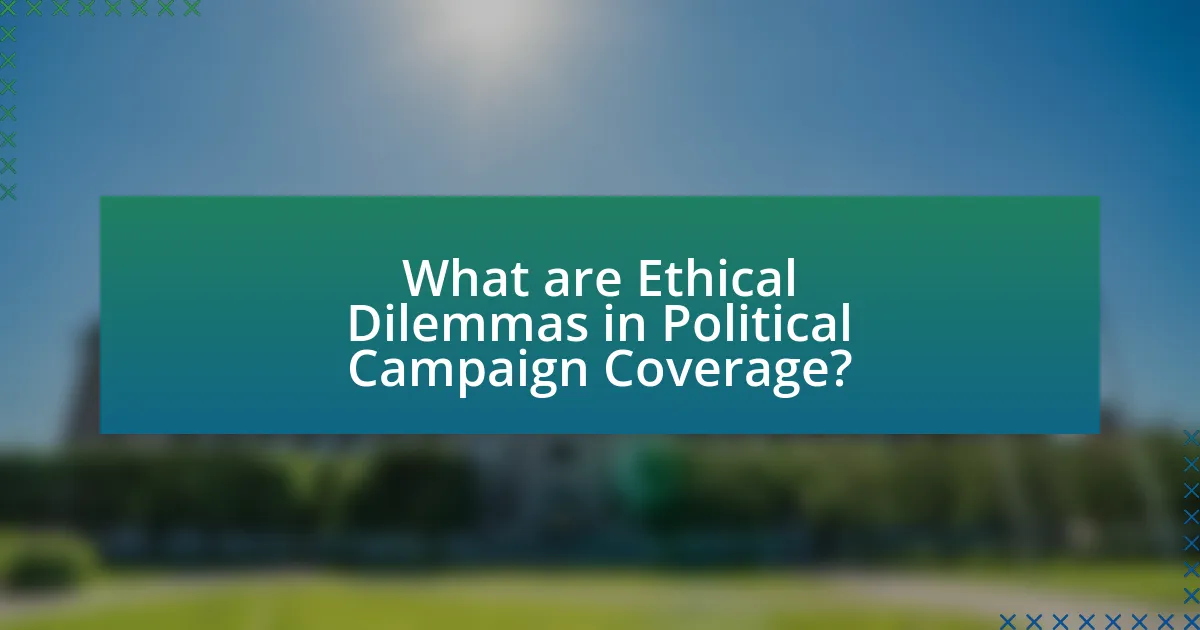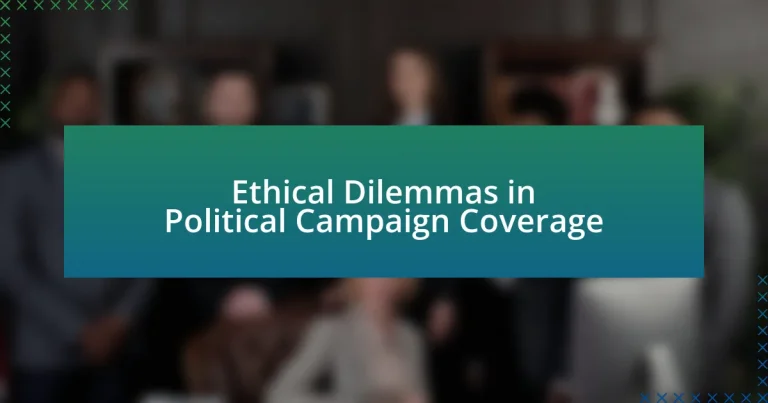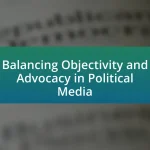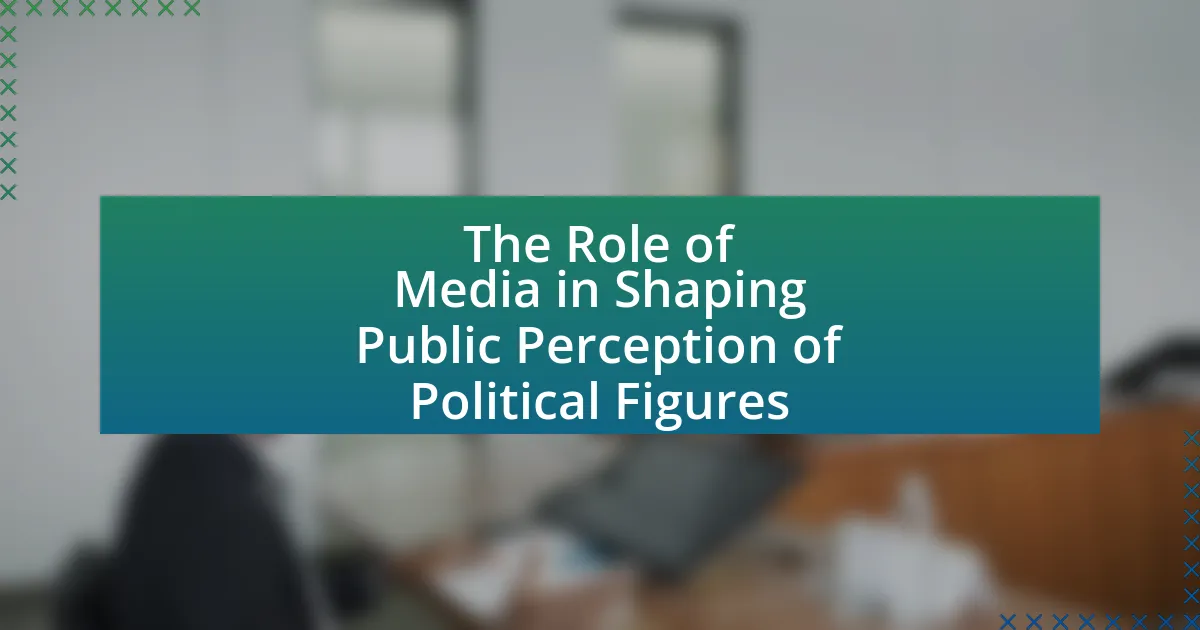The article examines ethical dilemmas in political campaign coverage, highlighting the challenges journalists face in balancing the duty to inform the public with the risks of bias and misinformation. It discusses the significance of these dilemmas in maintaining journalistic integrity and public trust, particularly in the context of historical events like the Watergate scandal and the 2000 U.S. presidential election. The article also explores common ethical issues, the influence of bias and misinformation on public perception, and the varying ethical standards across different media outlets. Additionally, it outlines best practices for journalists to navigate these dilemmas and the resources available for ethical guidance in journalism.

What are Ethical Dilemmas in Political Campaign Coverage?
Ethical dilemmas in political campaign coverage primarily involve balancing the duty to inform the public with the potential for bias and misinformation. Journalists face challenges such as the need for objectivity while covering candidates, the risk of sensationalism, and the impact of social media on the dissemination of information. For instance, a study by the Pew Research Center found that 62% of Americans believe news organizations favor one side in political coverage, highlighting concerns about perceived bias. Additionally, the pressure to attract viewership can lead to prioritizing dramatic narratives over factual reporting, which can mislead voters. These dilemmas underscore the importance of ethical standards in journalism to maintain credibility and public trust.
Why are ethical dilemmas significant in political campaign coverage?
Ethical dilemmas are significant in political campaign coverage because they directly impact the integrity of journalism and the public’s trust in democratic processes. When journalists face ethical challenges, such as balancing the need for transparency with the potential harm of exposing certain information, their decisions can shape public perception and influence electoral outcomes. For instance, the 2016 U.S. presidential election highlighted ethical concerns regarding the coverage of candidates’ personal lives and the implications of misinformation, which ultimately affected voter behavior and trust in media sources. Thus, ethical dilemmas in this context are crucial as they determine how information is presented and perceived, influencing democratic engagement and accountability.
What historical events highlight ethical dilemmas in political coverage?
Historical events that highlight ethical dilemmas in political coverage include the Watergate scandal and the coverage of the 2000 U.S. presidential election. The Watergate scandal, which involved a break-in at the Democratic National Committee headquarters and subsequent cover-up by the Nixon administration, raised questions about journalistic integrity and the responsibility of the press to investigate powerful figures. Journalists Bob Woodward and Carl Bernstein faced ethical challenges in balancing the need for confidentiality of sources with the public’s right to know, ultimately leading to President Nixon’s resignation.
Similarly, the 2000 U.S. presidential election, particularly the Florida recount, presented ethical dilemmas regarding media reporting and the influence of exit polls. News organizations prematurely declared winners based on incomplete data, which affected public perception and voter behavior. This situation highlighted the ethical responsibility of media outlets to provide accurate information and the potential consequences of misreporting in a closely contested election. Both events underscore the complexities and ethical considerations inherent in political coverage.
How do ethical dilemmas impact public perception of political campaigns?
Ethical dilemmas significantly influence public perception of political campaigns by shaping voter trust and credibility. When candidates face ethical issues, such as dishonesty or corruption, public confidence in their integrity diminishes, leading to negative perceptions. For instance, a study by the Pew Research Center found that 70% of voters believe that ethical behavior is crucial for political leaders, indicating that ethical lapses can result in decreased support and engagement from the electorate. Furthermore, media coverage of these dilemmas often amplifies their impact, as negative stories can dominate headlines and sway public opinion against candidates.
What are common ethical dilemmas faced by journalists in political coverage?
Common ethical dilemmas faced by journalists in political coverage include balancing objectivity with personal beliefs, managing conflicts of interest, and ensuring accuracy while reporting on fast-paced developments. Journalists often struggle with the need to present unbiased information while grappling with their own political views, which can influence their reporting. Additionally, conflicts of interest may arise when journalists have personal connections to political figures or organizations, potentially compromising their impartiality. The urgency of political news can lead to the dissemination of unverified information, raising concerns about accuracy and the potential spread of misinformation. These dilemmas highlight the complex landscape in which journalists operate, necessitating adherence to ethical standards to maintain public trust.
How does bias influence political campaign reporting?
Bias significantly influences political campaign reporting by shaping the narrative and framing of candidates and issues. Media outlets often exhibit partisan bias, which can lead to selective coverage that favors one candidate over another, impacting public perception. For instance, studies have shown that news organizations with a specific political leaning tend to highlight stories that align with their ideological stance, while downplaying or omitting opposing viewpoints. This selective reporting can distort the electorate’s understanding of candidates’ policies and qualifications, ultimately affecting voter behavior and election outcomes.
What role does misinformation play in ethical dilemmas during campaigns?
Misinformation significantly exacerbates ethical dilemmas during campaigns by distorting public perception and undermining informed decision-making. When candidates or their supporters disseminate false information, it creates a misleading narrative that can manipulate voter opinions and behaviors. For instance, a study by the Pew Research Center found that 64% of Americans believe that misinformation has a major impact on the political landscape, indicating widespread recognition of its influence. This manipulation raises ethical questions about the integrity of the campaign process and the responsibility of candidates to provide truthful information. Furthermore, misinformation can lead to polarization and distrust among the electorate, complicating the ethical obligations of media outlets and political actors to ensure fair and accurate reporting.
How do ethical standards vary across different media outlets?
Ethical standards vary significantly across different media outlets, influenced by factors such as ownership, audience, and editorial policies. For instance, mainstream news organizations like The New York Times adhere to strict journalistic ethics, emphasizing accuracy, fairness, and accountability, as outlined in their ethical guidelines. In contrast, partisan media outlets, such as Fox News or MSNBC, may prioritize advocacy and opinion over neutrality, leading to a more subjective interpretation of events. Research by the Pew Research Center indicates that audience expectations also shape these standards; consumers of partisan media often seek confirmation of their beliefs, which can result in a departure from traditional ethical norms. Thus, the ethical landscape in media is not uniform but rather reflects the diverse objectives and audiences of various outlets.
What guidelines do major news organizations follow regarding political coverage?
Major news organizations follow guidelines that emphasize accuracy, fairness, and impartiality in political coverage. These guidelines typically include fact-checking claims made by political figures, providing balanced perspectives by representing multiple viewpoints, and avoiding conflicts of interest to maintain credibility. For instance, the Society of Professional Journalists’ Code of Ethics advocates for journalists to seek truth and report it, which reinforces the importance of verifying information before publication. Additionally, organizations like the Associated Press and Reuters have specific standards that require journalists to disclose their sources and avoid sensationalism, ensuring that political reporting remains factual and responsible.
How do independent media outlets approach ethical dilemmas differently?
Independent media outlets approach ethical dilemmas differently by prioritizing transparency and accountability over profit motives. Unlike mainstream media, which may face pressures from advertisers or corporate owners, independent outlets often emphasize ethical reporting practices, such as disclosing conflicts of interest and providing balanced perspectives. For instance, a study by the Pew Research Center found that independent media are more likely to engage with their audience on ethical issues, fostering a dialogue about journalistic integrity. This commitment to ethical standards allows independent media to build trust with their audience, which is crucial during political campaign coverage where misinformation can be prevalent.
What are the consequences of unethical political campaign coverage?
Unethical political campaign coverage leads to misinformation, erosion of public trust, and polarization among voters. Misinformation can mislead the electorate, resulting in uninformed voting decisions, as evidenced by studies showing that false information spreads faster than the truth on social media platforms. The erosion of public trust occurs when media outlets prioritize sensationalism over factual reporting, leading to skepticism about all news sources; a 2021 Gallup poll indicated that only 36% of Americans trust the media to report the news fully, accurately, and fairly. Additionally, unethical coverage can exacerbate polarization, as biased reporting reinforces existing beliefs and divides the electorate, contributing to a more fragmented political landscape.
How can unethical reporting affect election outcomes?
Unethical reporting can significantly skew election outcomes by misinforming voters and manipulating public perception. For instance, biased or false information can lead to a misrepresentation of candidates, influencing voter decisions based on inaccuracies rather than facts. A study by the Pew Research Center found that 62% of Americans believe fabricated news stories cause confusion about basic facts, which can directly impact voter behavior and turnout. Furthermore, unethical reporting can create a hostile environment for candidates, affecting their ability to campaign effectively and engage with constituents. This manipulation of information undermines the democratic process, as voters may base their choices on misleading narratives rather than informed opinions.
What are the long-term effects on trust in media?
The long-term effects on trust in media include a significant decline in public confidence and increased skepticism towards news sources. Research indicates that consistent exposure to biased or misleading information can lead to a pervasive distrust in media institutions, as evidenced by a 2021 Pew Research Center study showing that 64% of Americans believe that news organizations intentionally mislead the public. This erosion of trust can result in audiences gravitating towards partisan outlets that reinforce their beliefs, further polarizing public opinion and diminishing the perceived credibility of journalism as a whole.
How can journalists navigate ethical dilemmas in political campaign coverage?
Journalists can navigate ethical dilemmas in political campaign coverage by adhering to established ethical guidelines, such as those outlined by the Society of Professional Journalists, which emphasize accuracy, fairness, and accountability. These guidelines encourage journalists to fact-check information rigorously, provide balanced perspectives, and disclose any potential conflicts of interest. For instance, during the 2020 U.S. presidential election, many news organizations implemented strict editorial standards to ensure that misinformation was promptly corrected and that all candidates received equitable coverage, thereby reinforcing journalistic integrity.
What best practices can journalists adopt to ensure ethical reporting?
Journalists can adopt several best practices to ensure ethical reporting, including verifying information before publication, maintaining transparency about sources, and avoiding conflicts of interest. Verifying information involves cross-checking facts with multiple reliable sources to prevent the dissemination of false information, which is crucial in political campaign coverage where misinformation can significantly impact public opinion. Maintaining transparency about sources fosters trust with the audience, as it allows readers to understand the basis of the information presented. Additionally, avoiding conflicts of interest ensures that journalists remain impartial and do not allow personal biases to influence their reporting, which is essential for maintaining credibility in political journalism. These practices are supported by ethical guidelines from organizations such as the Society of Professional Journalists, which emphasizes accuracy, fairness, and accountability in reporting.
How can transparency improve ethical standards in political coverage?
Transparency can improve ethical standards in political coverage by fostering accountability and trust between media outlets and the public. When journalists disclose their sources, funding, and potential conflicts of interest, it allows audiences to critically evaluate the information presented. For instance, a study by the Pew Research Center found that 70% of Americans believe that transparency in reporting enhances the credibility of news organizations. This increased credibility can lead to more responsible reporting, as journalists are motivated to adhere to ethical guidelines when they know their work is subject to public scrutiny.
What resources are available for journalists facing ethical dilemmas?
Journalists facing ethical dilemmas can access several resources to guide their decision-making. The Society of Professional Journalists (SPJ) provides a comprehensive Code of Ethics that outlines principles for ethical journalism, including accuracy, fairness, and accountability. Additionally, the Poynter Institute offers training and workshops focused on ethical decision-making in journalism, helping journalists navigate complex situations. Furthermore, the Online News Association (ONA) provides resources and discussions on ethical challenges in digital journalism, emphasizing the importance of transparency and integrity. These organizations collectively support journalists in addressing ethical dilemmas effectively.
Which organizations provide support and guidance on ethical journalism?
Organizations that provide support and guidance on ethical journalism include the Society of Professional Journalists (SPJ), the International Federation of Journalists (IFJ), and the Ethical Journalism Network (EJN). The SPJ offers a Code of Ethics that emphasizes principles such as seeking truth and reporting it, minimizing harm, and acting independently. The IFJ promotes ethical standards globally and provides resources for journalists facing ethical dilemmas. The EJN focuses on promoting ethical journalism practices and offers training and resources to help journalists navigate complex ethical issues. These organizations collectively contribute to the establishment and maintenance of ethical standards in journalism.
How can journalists stay informed about evolving ethical standards?
Journalists can stay informed about evolving ethical standards by actively engaging with professional organizations, attending workshops, and following industry publications. Professional organizations such as the Society of Professional Journalists and the International Federation of Journalists regularly update their codes of ethics and provide resources for journalists to understand current ethical practices. Workshops and conferences often feature discussions on emerging ethical dilemmas, allowing journalists to learn from experts and peers. Additionally, industry publications like the Columbia Journalism Review and Poynter Institute offer articles and analyses on ethical issues, helping journalists stay current with best practices and evolving standards in the field.
What strategies can audiences use to critically evaluate political campaign coverage?
Audiences can critically evaluate political campaign coverage by employing strategies such as cross-referencing information from multiple reputable sources, analyzing the language and tone used in reporting, and identifying potential biases in the coverage. Cross-referencing helps ensure accuracy, as studies show that information from diverse outlets can reveal discrepancies and provide a more balanced view. Analyzing language and tone allows audiences to detect emotional appeals or loaded language that may skew perceptions, which is crucial since research indicates that framing can significantly influence public opinion. Identifying biases involves recognizing the affiliations or funding sources of media outlets, as this can impact the objectivity of the coverage, supported by findings that suggest partisan media often presents information in a way that aligns with specific political agendas.




